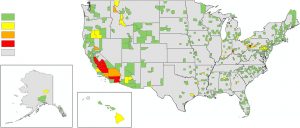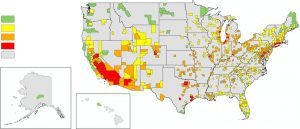“Meeting tighter pollution standards could prevent 63 avoidable deaths, 117 serious illnesses, and 88,414 adverse impact days in Birmingham alone.”
A report released this week by the American Thoracic Society and the Marron Institute of Urban Management at New York University shows the toll air pollution takes on public health. In “Estimated Excess Morbidity and Mortality Caused by Air Pollution above ATS Recommended Standards, 2011-2013,” researchers calculated the health benefits of stricter air pollution standards.
The interactive Health of the Air website, which complements the report, lets users enter their ZIP code to see the possible effect of reducing ozone and fine particle pollution (PM2.5) in terms of avoidable deaths, serious illnesses, and adverse impact days (e.g., missed days of school and work). Ozone and PM2.5 are both criteria air pollutants.
The standards that ATS recommends are consistent with what Gasp has recommended. They advocate 60 parts per billion (ppb) 8-hour standard for ozone (compared with the EPA’s standard of 70 ppb). They suggest a standard of 11 micrograms per cubic meter (µg/m3) annually for PM2.5, rather than the EPA’s 12 µg/m3 annual standard.
The findings show that meeting tighter pollution standards could prevent 63 avoidable deaths, 117 serious illnesses, and 88,414 adverse impact days in Birmingham alone. Alabama as a whole could potentially avoid 91 deaths, 179 serious illnesses, and 145,126 adverse impact days.
The report finds that across the United States, adhering to these stronger pollution standards could:
- Save 9,320 lives;
- Reduce serious health events (morbidities), such as heart attacks, hospital admissions and emergency room visits, by 21,400; and
- Decrease “adverse impact days,” during which people may not be able to work, go to school or otherwise be physically active because of severe breathing problems, by 19,300,000 days.
Harold P. Wimmer, National President and CEO of the American Lung Association, said in a statement:
“This research underscores the need for strong clean air protections, especially for the most vulnerable, including children, older adults and those in low-income communities, where air pollution takes a greater toll on health…Reducing ozone and particle pollution is essential to achieving the promise of the Clean Air Act: healthy air for all to breathe.”
We couldn’t agree more. This important report clearly demonstrates the urgent need to reduce ozone and particle pollution in order to protect those who live, work, and learn in Birmingham and indeed all of Alabama. We have urged and will continue to urge regulators and lawmakers alike to pass more protective air quality standards for all Alabamians. Everyone deserves to breathe clean air.
We’re dedicated to increasing awareness of the health effects of air pollution, increasing scientific literacy, and advocating for policies that will improve air quality for every Alabamian. Consider becoming a member to support this vital work.




